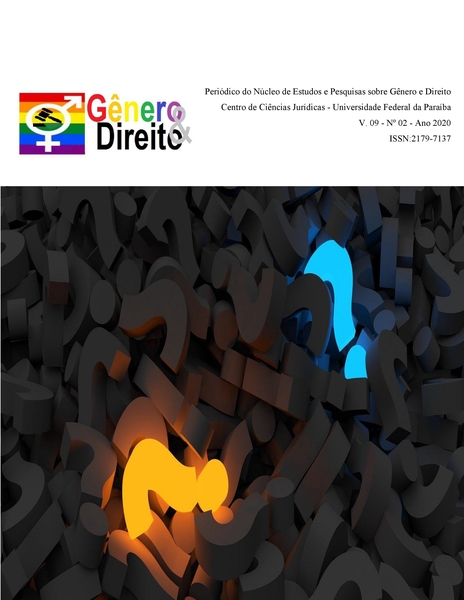THE TRAUMATIC CONFRONTATION WITH IDEOLOGY AND THE REAL IN E.L.DOCTOROW’S "WELCOME TO HARD TIMES":
A ŽIŽEKIAN STUDY
DOI:
https://doi.org/10.22478/ufpb.2179-7137.2020v9n2.50828Palavras-chave:
The Real, Symbolic Order, Ideology, Subject, Social realityResumo
Social reality in its essence is political, and any exploration of it needs a political performance. Concerning the issue, literature, by and large, has gained a political function through history. It has been an efficient political device to represent the role and the impact of ideology on the way of living and identity of people. E. L. Doctorow’s novels in general, and his Welcome To Hard Times in particular approve of the author’s interest in the ideological constitution of American society and the inevitable confrontation of the people with the intrusion of the Real [a Žižekian term] and the regressive work of ideology. In the light of Žižekian perception of the word, ideology is a form of socio-political philosophy in which practical elements are as prominent and decisive as theoretical ones. To him, ideology is a set of ideas licensing social actions and allocating subjects predetermined Symbolic Orders within the context of elusive reality. It gives them a social mandate, and a specific identity to deal with the worldly affairs. However, in Doctorow’s Welcome to Hard Times we come to a community of figures, marginal though, who take a rebellion action against ideology to alter the given identity employing their [personal] acts. The present study aims at exploring this reformative attempt on part of the people involved in ideological restrictions.
Downloads
Referências
Derrida, Jacques (1973).Speech and Phenomena and Other Essays on Husserl’s Theory of Sings. (trans. David B. Allison), Evanston: Northwestern University Press. Doctorow, E.L. (1960). Welcome To Hard Times. United States: Simon and Schuster.
Doctorow, E. L. (1960). Welcome to Hard Times. New York: Random House.
Homer, S (2005). Jacques Lacan. London and New York: Routledge.
Houdson, Beth (2008). The whole World in a Book: Fact, Fiction, and the Post Modern in Selected Works by E. L. Doctorow, N. P., n. d.
Jost, John D. et al. (2009). Political ideology: Its Structure, functions, and elective affinities. In Annual Review of Psychology, 308.
Lacan, J (1992 [1986]).The seminar of Jacques Lacan, Book VII: The Ethics Psychology 1959-1960, Psychoanalysis ed. J.-A. Miller, trans. D. Porter. London: Routledge.
Lacan, J (1998 [1975]). The seminar of Jacques Lacan, Book XX: Encore, On Feminine Sexuality, The Limits of Love and Knowledge1972-1973, ed. J.-A. Miller, trans. B. Fink, New York: Norton.
Lawrence D. Kritzman (1998). Politics, Philosophy, Culture: Interviews and Other Writing, 1977-1984. New York: Routledge.
Myers, Tony (2003). Slavoj Žižek. London and New York: Routledge.
Raja, Masood, Cahill Kevin, and Lene Johannessen (2007). Considering Class: Essays on the Discourse of the American Dream. Münster: Lit.
Ryan, Michael (2010). Cultural Studies: A Practical Introduction. Oxford: Wiley Blackwell.
Wolfreys, Julian, Ruth Robbins, and Kenneth Womack (2006). Key Concepts in Literary Theory. Edinburgh: Edinburgh UP.
Žižek, Slavoj (1991). For They Know Not What They Do: Enjoyment as a Political Factor. London and New York: verso.
Žižek, Slavoj (1994). The Metastases of Enjoyment: Six Essays on Woman and Causality. London: verso.
Žižek, Slavoj (1995). The Sublime Object of Ideology. London: verso.
Žižek, Slavoj (1997). The Plague of Fantasies. London and New York: Verso.
Žižek, Slavoj (1998). Cogito and the Unconscious Durkan: Duke University Press.
Žižek, Slavoj (1999). The Ticklish Subject: The Absent Centre of Political Ontology. London and New York: verso.
Žižek, Slavoj (2000). Enjoy Your Symptom! Jacques Lacan. In Hollywood and Out, 2nd edition. London and New York: Routledge.
Žižek, Slavoj (2000). The Fragile Absolute Or Why the Christian Legacy is Worth Fighting For. London and New York: verso.
Žižek, Slavoj (2001). On Belief. New York: Rutledge.
Žižek, Slavoj (2002). Welcome to the Desert of the Real! Five Essays on September 11 and Related Dates. London and New York: Verso.
Žižek, Slavoj (2005). Interrogating the Real. Eds. Rex Butler and Scot Stephens. London and New York: Continum.
Žižek, Slavoj (2006). The Parallax View. Cambridge, Massachusetts: The MIT Press.
Žižek, Slavoj (2014). Absolute Recoil: Or Toward a New Foundation of Dialectical Materialism. London and New York: Verso

